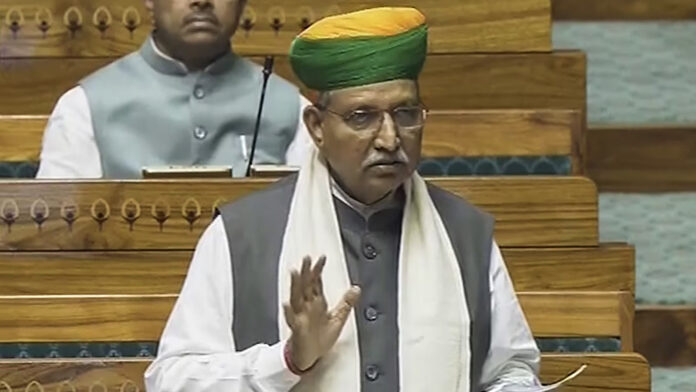The Lok Sabha introduced the contentious ‘One Nation, One Election’ bill on Tuesday, sparking a heated debate and strong resistance from Opposition parties. Despite the ruling BJP-led alliance securing majority support for the bill’s introduction with 269 votes in favor and 196 against, the proposal has been criticized as an attack on federalism and democracy.
The bill, tabled by Union Law Minister Arjun Ram Meghwal, includes the Constitution (One Hundred and Twenty-Ninth Amendment) Bill, 2024, and the Union Territories Laws (Amendment) Bill, 2024. These legislative changes aim to enable simultaneous elections for the Lok Sabha and state assemblies across India.
The proposed changes will now undergo detailed scrutiny by a Joint Parliamentary Committee (JPC) as per the government’s directive.
Opposition’s Concerns
Opposition leaders voiced apprehensions about the bill’s potential consequences on India’s federal structure and democratic principles.
- Congress MP Gaurav Gogoi argued that the financial savings from simultaneous elections—such as the Rs 3,700 crore spent on the 2024 Lok Sabha elections, representing just 0.02% of the annual budget—are negligible compared to the threat posed to state autonomy.
- Congress MP Kiran Kumar Chamala and Shashi Tharoor criticized the bill as unconstitutional, emphasizing the need for wider discussions before sending it to the JPC. Tharoor further stated that the BJP lacks the required two-thirds majority for passing a constitutional amendment.
- Independent MP Pappu Yadav accused the government of diverting attention from critical issues, stating, “This bill will harm regional parties the most.”
- TMC MP Saugata Roy and Kalyan Banerjee echoed concerns about the bill undermining India’s federal structure, warning that it could move the country towards a presidential form of governance.
Support for the Bill
The BJP and allied voices defended the bill as a step toward strengthening democratic efficiency.
- RSS leader Indresh Kumar described the proposal as aligning with the “core values of the Constitution”, calling it a progressive move to streamline governance.
- Shiv Sena MP Milind Deora lauded the initiative for reducing the financial and logistical burden of frequent elections, enabling the government to focus on policymaking.
- Union Minister Shivraj Singh Chouhan argued that recurrent elections hinder development and prevent governments from making long-term decisions.
BJP’s Internal Dynamics
While the BJP successfully introduced the bill, sources revealed that over 20 party MPs, including Nitin Gadkari, Jyotiraditya Scindia, and Giriraj Singh, were absent during the division. The party is reportedly issuing notices to the absentees, seeking explanations for their non-attendance despite a three-line whip being issued.
Next Steps
The bill, which proposes a significant restructuring of India’s electoral process, will now be reviewed by the Joint Parliamentary Committee for further deliberations. Union Home Minister Amit Shah noted that the decision to send the bill to the JPC reflects Prime Minister Narendra Modi’s commitment to ensuring detailed discussions on the matter.
As the debate continues, the bill has underscored the ideological divide between the ruling BJP and Opposition parties, setting the stage for an intense legislative battle in the months ahead.


